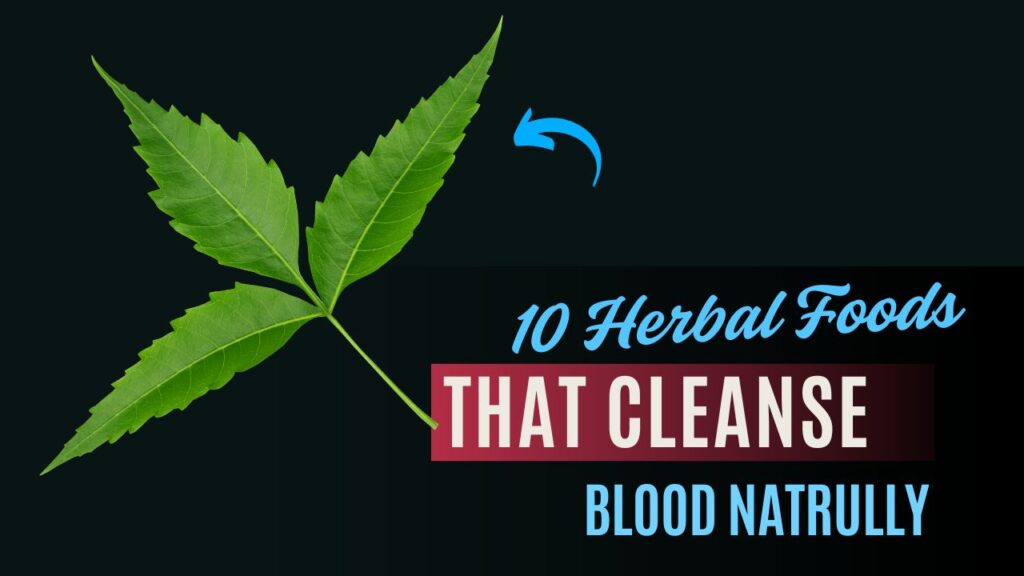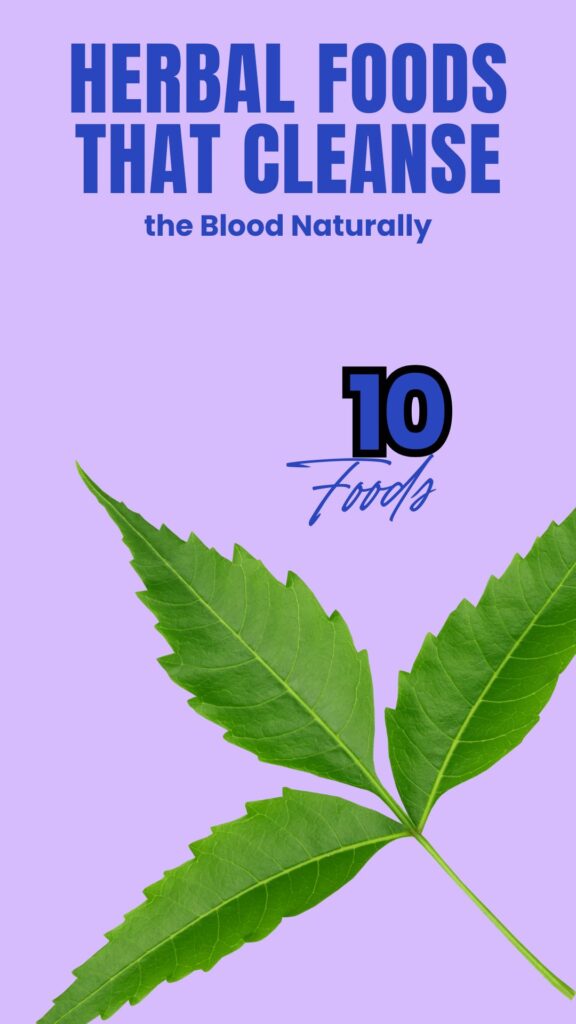Some links in this post are affiliate links. If you make a purchase through these links, I may receive a small commission. This helps support the site at no extra cost to you.
Struggling with fatigue, dull skin, or recurring health issues? The root cause may lie deeper than you think—your blood health.
Clean blood ensures that oxygen and nutrients reach every cell in your body while efficiently removing toxins.
But when your blood becomes loaded with impurities from processed foods, pollution, and stress, it can lead to low energy, acne, poor immunity, and even long-term chronic conditions.
Here’s the good news: nature has given us powerful herbal foods that act as natural blood purifiers. These foods not only cleanse the bloodstream but also boost liver and kidney function—the organs responsible for filtering out toxins.
In this guide, you’ll discover 10 herbal foods that naturally cleanse your blood, along with practical tips on how to use them, who should consume them, storage advice, and possible side effects.
Let’s explore the top herbal foods that keep your blood clean and your body thriving.

Table of Contents

10 Best Herbal Foods To Clean Blood
1. Turmeric
A golden spice celebrated in Ayurveda and traditional medicine, turmeric is a natural detoxifier. Its active compound, curcumin, is known for anti-inflammatory and antioxidant benefits that help cleanse the blood.
Best Ways to Eat or Use It
- Add a teaspoon of turmeric to warm milk or tea.
- Mix into curries, soups, or rice dishes.
- Use fresh turmeric root in smoothies.
Who Should Eat / Avoid
- Good for: People with inflammatory conditions, athletes needing faster recovery, and those wanting radiant skin.
- Avoid if: You have gallbladder problems, are on blood-thinning medications, or are pregnant (in large amounts).
Storage & Buying Tips
- Buy organic turmeric powder or fresh roots.
- Store in an airtight container away from sunlight.
- Fresh roots last longer when refrigerated.
Do’s & Don’ts
| ✅ Do | ❌ Don’t |
|---|---|
| Add a pinch daily for long-term benefits | Consume in very high doses |
| Pair with black pepper for better absorption | Store in damp areas |
Possible Side Effects
Excessive consumption may cause stomach upset or thin the blood too much.
2. Neem Leaves
In many cultures, neem is called “nature’s pharmacy.” Its bitter compounds flush toxins, fight bacteria, and purify blood effectively.
Best Ways to Eat or Use It
- Drink neem tea made from fresh or dried leaves.
- Chew a couple of tender leaves in the morning (if you can handle the bitterness).
- Use neem supplements in capsule form.
Who Should Eat / Avoid
- Good for: People with acne, skin issues, or weak immunity.
- Avoid if: Pregnant women, breastfeeding mothers, or people with low blood sugar.
Storage & Buying Tips
- Fresh leaves should be washed and stored in the fridge wrapped in a damp cloth.
- Dried neem powder lasts months if stored in an airtight jar.
Do’s & Don’ts
| ✅ Do | ❌ Don’t |
|---|---|
| Use in moderation for cleansing | Overuse, as bitterness may cause nausea |
| Prefer fresh leaves for maximum benefit | Give to children unsupervised |
Possible Side Effects
Overconsumption can lower blood sugar drastically or cause stomach upset.
3. Garlic
Garlic is more than just a kitchen staple—it’s a natural blood cleanser with strong antibacterial and detoxifying properties.
Best Ways to Eat or Use It
- Eat raw garlic on an empty stomach for best results.
- Add to stir-fries, soups, or roasted dishes.
- Mix with honey for a milder taste.
Who Should Eat / Avoid
- Good for: People with high cholesterol, weak immunity, or poor circulation.
- Avoid if: You have bleeding disorders or take anticoagulants.
Storage & Buying Tips
- Choose firm bulbs without sprouting.
- Store in a cool, dry place (not the fridge).
Do’s & Don’ts
| ✅ Do | ❌ Don’t |
|---|---|
| Use raw garlic for maximum cleansing | Overcook, which reduces potency |
| Combine with lemon or ginger for detox drinks | Consume in excess, leading to bad breath & acidity |
Possible Side Effects
Excess garlic may cause bloating, heartburn, or excessive bleeding in sensitive people.
4. Cilantro (Coriander Leaves)
Cilantro is known for its ability to remove heavy metals like mercury and lead from the bloodstream.
Best Ways to Eat or Use It
- Blend into green smoothies.
- Use as a garnish for salads and curries.
- Prepare cilantro chutney.
Who Should Eat / Avoid
- Good for: People exposed to pollution or heavy metals.
- Avoid if: You have severe coriander allergies.
Storage & Buying Tips
- Wrap in a damp paper towel and refrigerate.
- Freeze chopped cilantro with olive oil in ice cube trays for long-term use.
Do’s & Don’ts
| ✅ Do | ❌ Don’t |
|---|---|
| Wash thoroughly before eating | Store in sealed plastic bags without airflow |
| Use fresh leaves for maximum detox | Expose to direct sunlight |
Possible Side Effects
In rare cases, overconsumption can cause allergic reactions or light sensitivity.
5. Dandelion Greens
Often dismissed as weeds, dandelion greens are rich in antioxidants and help the liver filter toxins from the blood.
Best Ways to Eat or Use It
- Add to salads or soups.
- Brew into dandelion tea.
- Blend into juices with apples or carrots.
Who Should Eat / Avoid
- Good for: People with sluggish digestion or water retention.
- Avoid if: You have ragweed allergies or gallbladder issues.
Storage & Buying Tips
- Store greens in the fridge wrapped in a damp towel.
- Consume within 3–4 days for freshness.
Do’s & Don’ts
| ✅ Do | ❌ Don’t |
|---|---|
| Use young leaves (less bitter) | Overconsume, leading to diarrhea |
| Pair with citrus fruits for better taste | Store without washing |
Possible Side Effects
May cause allergic reactions in sensitive individuals.
6. Beetroot
Beetroot enhances oxygen supply and helps the liver filter out impurities.
Best Ways to Eat or Use It
- Drink beetroot juice with lemon.
- Roast or steam for salads.
- Blend into smoothies with carrots.
Who Should Eat / Avoid
- Good for: Athletes, people with anemia, or those needing stamina.
- Avoid if: You have kidney stones (high oxalate content).
Storage & Buying Tips
- Select firm, smooth beets.
- Store in the fridge with tops removed.
Do’s & Don’ts
| ✅ Do | ❌ Don’t |
|---|---|
| Eat raw or lightly cooked | Overboil, which reduces nutrients |
| Pair with leafy greens for balance | Store with leaves attached |
Possible Side Effects
Overconsumption can cause beeturia (pink urine) or kidney stone risks.
7. Ginger
Ginger improves circulation, reduces inflammation, and boosts digestion—helping toxins leave the bloodstream faster.
Best Ways to Eat or Use It
- Brew ginger tea.
- Add grated ginger to curries and stir-fries.
- Mix into smoothies.
Who Should Eat / Avoid
- Good for: People with weak digestion or colds.
- Avoid if: You’re pregnant (in large amounts) or have gallstones.
Storage & Buying Tips
- Store fresh ginger in the fridge wrapped in paper towels.
- Freeze grated ginger in small portions.
Do’s & Don’ts
| ✅ Do | ❌ Don’t |
|---|---|
| Use fresh ginger for maximum effect | Store in moist areas |
| Combine with lemon and honey | Take in excess (may cause heartburn) |
Possible Side Effects
Too much ginger can cause acidity or thin the blood.
8. Basil Leaves (Tulsi)
Basil leaves, especially holy basil (Tulsi), act as a natural adaptogen, cleansing toxins and improving blood circulation.
Best Ways to Eat or Use It
- Brew Tulsi tea.
- Chew fresh leaves.
- Add to soups, sauces, or herbal infusions.
Who Should Eat / Avoid
- Good for: People with respiratory issues or stress.
- Avoid if: Pregnant women in large amounts.
Storage & Buying Tips
- Keep fresh leaves in a glass of water or refrigerate wrapped in paper towels.
- Dried basil lasts longer in airtight jars.
Do’s & Don’ts
| ✅ Do | ❌ Don’t |
|---|---|
| Use in moderation daily | Consume in large, concentrated doses |
| Drink Tulsi tea for blood cleansing | Store in humid conditions |
Possible Side Effects
Excess may affect fertility or blood clotting.
9. Fenugreek Seeds
Fenugreek helps regulate blood sugar and eliminates impurities from the bloodstream.
Best Ways to Eat or Use It
- Soak overnight and eat on an empty stomach.
- Add to curries, soups, or salads.
- Brew into herbal tea.
Who Should Eat / Avoid
- Good for: Diabetics, lactating mothers, and people with digestive issues.
- Avoid if: You have thyroid problems or are pregnant (in high doses).
Storage & Buying Tips
- Store dry seeds in airtight jars.
- Refrigerate soaked seeds if not consumed immediately.
Do’s & Don’ts
| ✅ Do | ❌ Don’t |
|---|---|
| Soak before eating for best results | Consume raw in excess |
| Use sprouts for extra nutrients | Store in damp containers |
Possible Side Effects
May cause bloating or diarrhea if overconsumed.
10. Red Clover
Red clover is an age-old herbal remedy that purifies the blood and improves circulation.
Best Ways to Eat or Use It
- Brew red clover tea.
- Use dried flowers in herbal blends.
- Add sprouts to salads.
Who Should Eat / Avoid
- Good for: Women in menopause, people with skin issues.
- Avoid if: You are pregnant, breastfeeding, or on hormone therapy.
Storage & Buying Tips
- Store dried flowers in an airtight jar away from sunlight.
- Fresh sprouts last a few days in the fridge.
Do’s & Don’ts
| ✅ Do | ❌ Don’t |
|---|---|
| Drink tea moderately | Overconsume without guidance |
| Buy from trusted herbal stores | Use during pregnancy |
Possible Side Effects
Can interfere with hormone-sensitive conditions.
Conclusion
Your blood is your body’s lifeline, carrying oxygen and nutrients while flushing out toxins. But modern lifestyles often overload it with impurities.
The herbal foods listed above—turmeric, neem, garlic, cilantro, dandelion, beetroot, ginger, basil, fenugreek, and red clover—are nature’s best way to cleanse your bloodstream naturally.
Including even a few of these foods in your daily meals can lead to clearer skin, more energy, and stronger immunity. Start small—maybe a turmeric latte in the morning, a cilantro chutney with lunch, or a ginger tea at night.
Your body will thank you for nourishing it with these natural blood purifiers.
Now it’s your turn— which of these herbal foods will you add to your next meal? Share your favorite recipe or tip in the comments below!
Frequently Asked Questions (FAQs)
Why is blood cleansing important for health?
Blood cleansing helps the body remove toxins, supports liver and kidney function, boosts immunity, improves skin health, and increases overall energy levels.
Can I rely only on herbal foods for blood purification?
While herbal foods are excellent natural purifiers, maintaining clean blood also requires a balanced diet, proper hydration, regular exercise, and good sleep.
How often should I consume these herbal foods?
Most of these can be included daily in moderate amounts. For example, turmeric can be used daily in small quantities, while stronger herbs like neem should be taken a few times per week.
Are there any side effects of blood cleansing foods?
Yes, overconsumption may cause issues such as stomach upset, allergic reactions, or interference with certain medications. Always start with small amounts and consult a doctor if you have medical conditions.
Can pregnant or breastfeeding women eat these herbs?
Some herbs like neem, fenugreek (in high amounts), and red clover should be avoided during pregnancy or lactation. It’s best to consult a healthcare provider first.
Do herbal foods replace the need for medical detox treatments?
No, these foods support your body’s natural detox system but do not replace medical treatments. If you have a serious condition, consult a healthcare professional.
How long does it take to see results from these foods?
You may start noticing improvements in digestion, energy, and skin within a few weeks of regular consumption, but long-term benefits come with consistent use.
Can children eat these blood cleansing foods?
Yes, but only in mild and safe forms (like turmeric in milk or beetroot in smoothies). Strong herbs such as neem and red clover are not recommended for children without medical advice.
Do I need supplements, or are natural foods enough?
Natural foods are usually enough for general detox. Supplements may be useful if prescribed by a doctor for specific deficiencies or health conditions.
Which is the best herbal food for daily use?
Turmeric, ginger, garlic, and cilantro are among the safest and most effective for daily use in small amounts.










